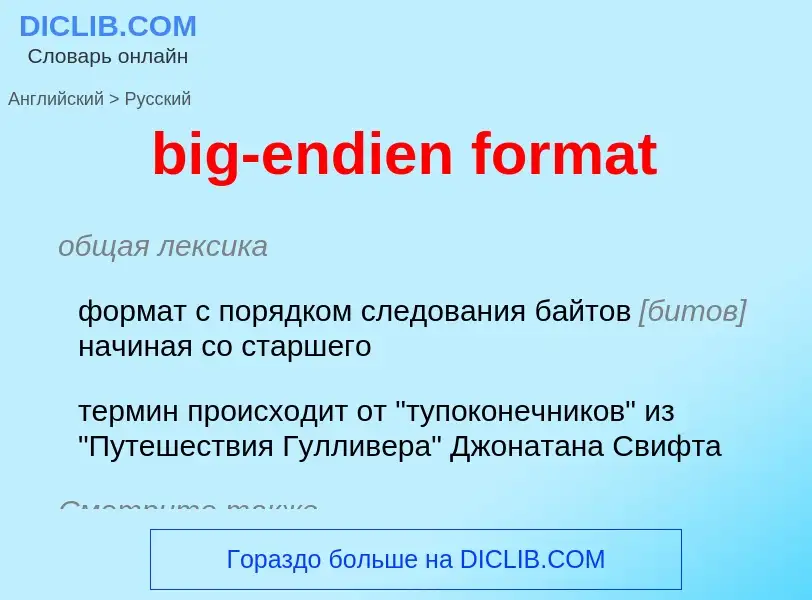Перевод и анализ слов искусственным интеллектом ChatGPT
На этой странице Вы можете получить подробный анализ слова или словосочетания, произведенный с помощью лучшей на сегодняшний день технологии искусственного интеллекта:
- как употребляется слово
- частота употребления
- используется оно чаще в устной или письменной речи
- варианты перевода слова
- примеры употребления (несколько фраз с переводом)
- этимология
big-endien format - перевод на Английский
общая лексика
формат с порядком следования байтов [битов] начиная со старшего
термин происходит от "тупоконечников" из "Путешествия Гулливера" Джонатана Свифта
Смотрите также
['fɔ:mæt]
общая лексика
формат
схема расположения и представления данных при хранении, вводе-выводе с/на внешние устройства или пересылке по компьютерным сетям
размечать, форматировать
формат издания
строительное дело
форма, вид
синоним
Смотрите также
существительное
['fɔ:mæt]
общая лексика
формат (книги)
размер
форма
характер
вид
программирование
формат
форма записи или представления информации
вычислительная техника
разметка или формат диска
формат записи
Франция
формат книги
глагол
вычислительная техника
форматировать
полиграфия
оформлять (книги и т. п.)
Определение
Википедия
A TV format is the overall concept and branding of a copyrighted television show. The most common type of formats are those in the television genres of game shows and reality shows, many of which are remade in multiple markets with local contestants. Recent examples include Survivor, Who Wants to Be a Millionaire?, Pop Idol and Big Brother that have all proved successful worldwide. Such types of formats are also known as franchises, since rights to the format are usually handled with licenses.
Particular models in the genre of sitcoms are often sold as formats, enabling broadcasters to adapt them to the perceived tastes of their own audience. An example is The Office, a BBC sitcom which got adapted as The Office (U.S.) in the United States, Kontoret in Sweden, HaMisrad in Israel, Le Bureau in France, The Office (India) in India, Stromberg in Germany, La Job in Quebec, Canada and La Ofis in Chile.
A format is licensed by TV networks, so that they may produce a version of the show tailored to their nationality and audience. Formats are a major part of the international television market. Format purchasing is popular with broadcasters, due principally to the lower risk associated with an already-proven idea and the preference of audiences to watch programming tailored to their locality.
Leading companies that handle the creation and sales of programming formats include Warner Bros. International Television Production, ITV Studios, Talpa, Endemol Shine and Fremantle.


![<code>FORMAT.CMD</code> in [[CP/M-86]] <code>FORMAT.CMD</code> in [[CP/M-86]]](https://commons.wikimedia.org/wiki/Special:FilePath/CPM-86.png?width=200)
![<code>FORMAT.COM</code>, among several other commands, in [[IBM PC DOS]] 1.0. <code>FORMAT.COM</code>, among several other commands, in [[IBM PC DOS]] 1.0.](https://commons.wikimedia.org/wiki/Special:FilePath/IBM PC DOS 1.0 screenshot.png?width=200)
![format}} command on [[ReactOS]] format}} command on [[ReactOS]]](https://commons.wikimedia.org/wiki/Special:FilePath/ReactOS-0.4.13 format command 667x514.png?width=200)
